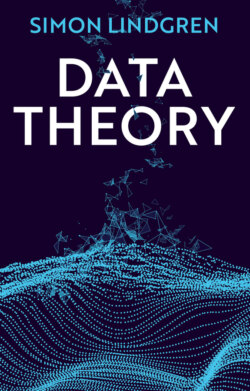Читать книгу Data Theory - Simon Lindgren - Страница 10
Theories old and new
ОглавлениеSociological theory, and often such theories that were developed in the pre-digital age, can contribute immensely to our understanding of things that we are now in the process of, maybe unnecessarily, inventing new names for: ‘viral communication’, ‘user-generated content’, ‘the blogosphere’, ‘online hate’, ‘cyber bullying’, and so on. I do not mean that such words, at least not all of them, are merely superfluous synonyms for things that we already have names for. Nor do I claim that any old theory is always better than a new one, or that such old theories can be applied unproblematically to twenty-first-century phenomena without modification. But, in many cases, we run the infamous risk of throwing the baby out with the bath water. When researching the peculiarities and novelties of interaction and communication in the datafied society, we risk mistaking theories about general patterns of social life as being obsolete just because they were developed in non-digital contexts.
The already established theories are useful because, even though settings change, we may often be dealing with the same underlying social forms as before. Georg Simmel (1895, p. 54) argued that the most important task for the sociologist is to separate analytically the form of social life from its content, even though the two are in reality inseparably united. The aim of the analysis must be to detach the forms from their contents and to bring them together systematically: ‘For it is evident that the same form […] can arise in connection with the most varied elements.’ Simmel continued to explain that:
We find, for example, the same forms of authority and subordination, of competition, imitation, opposition, division of labor, in social groups which are the most different possible.
(Simmel, 1895, p. 55)
Let us assume, to take but one example, that we were to establish empirically that people on social media sometimes find themselves disillusioned by their own social media use, and that they feel as if they are just like cogs in a bigger machine beyond their individual control. Let us also assume that our analysis made us think that this may even be a form of oppression or exploitation, where social media conglomerates make a profit from what disillusioned and exploited users post online. We may simply invent a new flashy theoretical concept for this, say: ‘digital brainwash’ or ‘social media disconnect’. But we could also make the effort of going back to already established social theories. In my present example, a good option may have been Karl Marx’s 1844 theory about alienation (Marx, 1844, pp. 69–84). The social form of alienation, in that case, may transcend the contexts of nineteenth-century industrial capitalism and social life on the twenty-first-century internet. Once we see that, we also enable other insights such as, for example, that our present-day society may still be quite similar in some respects to nineteenth-century industrial capitalism.
I do not mean to say that such theoretical connections are not already made by many scholars, nor do I mean that anyone who does not do it at every opportunity is lazy or wrong. I myself am a repeat offender. And, conversely, it may indeed sometimes be a good idea actually to invent new concepts – how else would theories develop? – and in most cases there needs to be some sort of updating or modification of the old theory that is re-employed. On the one hand, this book is an explicit effort to explore and show how to apply existing, trusty, and well-worn social theory systematically, through data science, to social media politics with this kind of ambition and aspiration. On the other hand, the book is just as much an encouragement to combine and re-invent theories in eclectic ways. I will return, throughout the book, to issues of theory, as universal truth versus theory, as emergent and constantly renegotiated.
